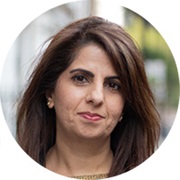- OT
- Life in practice
- Career development
- “With networking, you get to speak to the entire profession”
Locum digest
“With networking, you get to speak to the entire profession”
From helpful resources to maintaining authenticity, OT posed seven questions on locuming to the AOP’s current and former locum Councillors

20 August 2023
From reaching out for initial conversations to building relationships that stick, self-employment can be a minefield – especially for those who are just starting out.
Luckily, there are lots of seasoned locum optometrists on hand to share their knowledge – on everything from facing down early fears to communicating effectively with practice owners in the long-term.

Meera Sodha
Occupation:Locum optometrist and AOP locum Councillor

Kristen Cottier
Occupation:Locum optometrist and former AOP locum Councillor
1 What is your approach to networking as a locum?
Meera Sodha (MS): Networking is a big part of being a locum. Without networking, you don’t get to speak to directors, practice owners, dispensing opticians. With networking, you get to speak to the entire profession. It’s a huge part of it.
It’s really important to attend Local Optical Committee (LOC) meetings, because that’s where you get to meet local practitioners, if you want to work within the area.
Continuing professional development (CPD) meetings are important too. You find that during breaks, you start chatting with other optometrists and dispensing opticians (DOs) who are attending the course.
It is about building relationships, due to repeated attendance. LOC meetings especially are brilliant, because you see a lot of the same people, so you start forming a relationship with them.
If working within a large practice, it’s always important to start talking to the locum DOs there, because they’re obviously working for a lot of different practices. So, always build a relationship with them. One of my current roles, I got through someone I worked with who was a DO. That is really important.
Kristen Cottier (KC): Always try to be friendly. Optics is such a small world that you are most likely going to meet the same people in various roles over the coming years.
2 Any tips for those who might be nervous about damaging relationships when negotiating, for example, over an increased day rate?
KC: Always know your worth; ie, how many patients you see, how much revenue you produce, and what happens to the clinic when you are not there. I’d advise you to practise what you want to say with friends or family, and they can help you reword it if needed.
This quote [from the film We Bought a Zoo] is one I love: “Sometimes all you need is 20 seconds of insane courage. Just literally 20 seconds of embarrassing bravery. And I promise you, something great will come of it.”
MS: When you’re new to locuming and you’re going into a new practice, it’s important to be realistic. I’ve had conversations where I say, “this is what my daily rate is; this is what I tend to work for.” There have been instances where practice owners have said, “Fine, yes, let’s go with it,” but it’s best to be open.
I’ve had practice owners who have said, “Look, this is what we expect to pay.” In that case, I offer to do a trial day. With permanent positions, there’s always a probationary period. As a locum, a trial day lets both of us know how we feel, and whether I want to work for what they’re paying. If it’s a nice enough practice, and it’s around the corner from where I live, I might make an allowance for a slightly lower rate. Or, they might see what I'm capable of. Then, we revisit what I’m charging and what they are paying me, and go from there.
One of the practices that I’ve worked for was open 9am to 6pm. Due to my injury, I said ‘look, I can’t do a 9am to 6pm.’ We negotiated the times and rates, and they were open about it because they knew what my work was like. I think that helps quite a lot. Once you’re in practice, and they’ve seen what you’re capable of, it opens a platform for a better conversation. But be honest from the start, because you don’t want to go in and work for 10 hours and find that you were really unhappy and you would rather not have worked there.
When I’m working through agencies, I’ll always ask about test times, rates, and finish times, and how flexible the directors are. The agencies generally know the managers and owners, so they’ll have some guidance on how to work around that.
3 What is the one thing you wish you knew about networking and building relationships when you started locuming?
KC: Everyone is important, and everyone matters. Remember what I said about optics being a small world: the trainee dispensing assistant of today may be the manager of tomorrow. People will chat and gossip about you and long-term, you want them to think and say positive things about you.
MS: It is [about] attending meetings. I did that a lot at the beginning of my locuming career, and that is, I think, one of the key things: don’t get lazy, attend all your LOCs. That is the one big thing.
The other thing was not to get comfortable, because you are a locum at the end of the day. Don’t stop networking, and don’t put all your eggs in one basket.
4 What would you say to someone who might be anxious about speaking to a practice manager or owner?
KC: Prepare what you want to say, and the reasoning behind it. Did I mention ‘20 seconds of insane courage’ already?
MS: Just remember that the other person is also a human being. At some point, they’ve also been at a starting point in their career. I’ve always approached meetings and interviews with that knowledge, which has put me in quite a confident, comfortable place, because I’ve never approached an interview thinking, ‘oh my god, this is the decision maker.’ They are, but don’t focus on that, because that will create a lot of anxiety.
Be prepared. I look up all the details on the practice and the directors or owners, so I have background knowledge on them and what equipment they’ve got in practice.
I think a physical business card is a brilliant thing. You’ll be walking around town, and you’ll see an independent or a multiple. If it looks quiet, I walk in and hand a card in. If you’re doing that within your local area, do a bit of research. Most practices have good websites, which have a lot of information on them, so build up that before you go in. Hopefully that will calm the nerves down, because you’re speaking to the person knowing a little bit about them.
5 Do you have any strong professional relationships that have come about through your locuming?
KC: Oh, definitely. When a practice owner entrusts their patients and business to your skills and ability, you develop a strong mutual trust. Similarly, when working with other optometrists, resident or locum, you build trust in the other’s work, skills and ability.
MS: I’ve got a lot of relationships. A lot of my work has come about through networking: attending LOC meetings, starting to talk to people, and being introduced to practices via those links, for example optometrists who have locumed at places before.
People who are moving out of areas, going on maternity leave, or going into permanent roles, will introduce you to practice owners. I’ve made a lot of friends, and I keep in touch with a lot of those people, who guide you in in many ways, not just for work. When COVID-19 started, for example, a lot of people who I don’t work for but who I had built relationships with supported me through the entire process.
When a practice owner entrusts their patients and business to your skills and ability, you develop a strong mutual trust
6 Are there any resources that you use that help with relationship building or networking as a locum?
KC: Face-to-face events and meetings like those at 100% Optical, and local CPD events and meetings. You have to ‘work the room.’ Chat to someone for a few minutes and then move on. Those moments with company reps, directors, optometrists and dispensing opticians are a great way to build networks and open the doors to new opportunities.
Also, LinkedIn is an interesting resource as it gives you the opportunity to have a page of information about your skills and ability. Locum recruiters are proactive in making contact with locums via this platform.
MS: Meetings are a big part of it. Job boards are really underused. Neither practice owners nor locums are putting themselves out there on these things, but that’s quite important.
Also, business cards. A lot of locums have completely dismissed them, but often I’ll walk past and drop a CV and a business card into a practice. I’ve had a lot of work through that, because when their regular locums are not able to pitch in, they’ll pick my business card up.
Talking to people is the most important thing. I’m part of several WhatsApp groups that people have started to help locums out. I’ve joined locum groups for different parts of the country. It’s about keeping in touch with people you know, because they might then know someone who has got another helpful resource. It’s about linking up.
LinkedIn has been phenomenal. I've really underused LinkedIn, but in the past year or two, I’ve become more proactive. Connect with optometrists and practice owners on there. People accept your invites. If you see an optometrist in the area, connect with them, and build a relationship with them.
You always want to put your best foot forward, but often I find that if you put your real self forward it becomes a lot easier
7 Is there anything you advise to make networking feel authentic, rather than forced?
MS: If you do it often enough it becomes more natural, because you’re not out there selling yourself as much. It’s about building relationships. Optometry is a very small world, so when you go to enough meetings, you start seeing a lot of the same people in the same places.
You always want to put your best foot forward, but often I find that if you put your real self forward it becomes a lot easier. Look at it as building a relationship, rather than looking for work.
KC: Always be yourself. An employer is buying you and your skills, and falsehood will out itself very quickly.
12 locum networking tips from Kristen and Meera
- Attend LOC meetings regularly
- Talk to locum DOs
- Print and distribute business cards
- Research practice owners
- Practice negotiating
- Suggest paid trial days
- Use agencies
- Join local WhatsApp groups
- Reach out on LinkedIn
- Use job boards
- Don’t get too comfortable
- Be brave (if only for 20 seconds).
Advertisement


Comments (0)
You must be logged in to join the discussion. Log in